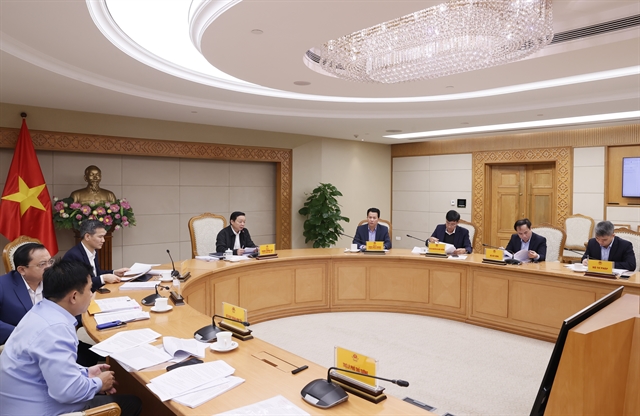 Society
Society


|
| Deputy Prime Minister Trần Hồng Hà and ministry representatives at the Wednesday meeting. — VNA/VNS Photo Văn Điệp |
HÀ NỘI — Deputy Prime Minister Trần Hồng Hà emphasised the management of mineral mining, trade and processing as he chaired a review meeting of the draft Law on Geology and Minerals on Wednesday.
The draft law designates the Ministry of Natural Resources and Environment (MoNRE) as the state agency in charge of geological and mineral planning and assessment.
The MoNRE will also coordinate with the Ministry of Construction (MoC) and Ministry of Industry and Trade (MoIT) to develop and approve plans and surveys related to geology and minerals, as well as the standard regulations, procedures and appraisal of evaluation agencies in the field.
The ministries will also work on a regulation that specifies fees for mineral mining permission, taking into account the pricing on the global markets.
Deputy PM Hà also reviewed the bidding activities for minerals of special significance and high economic value as recognised by the government, in addition to the National Mineral Reserve Assessment Council’s authority and responsibilities towards state-funded mineral survey results and reports to increase mineral reserves.
According to the MoNRE, the draft will make into law the Party and the State directions on natural resource management, environmental protection and strategy for geology and the mineral mining industry to 2030, with a vision towards 2045.
The document will also establish a comprehensive legal framework for the protection of unexploited geological resources and minerals, strengthening labour safety in mineral mining, and balancing the interests of the organisations and individuals in the industry with that of the state and the local communities.
More authority is also expected to be given to the local government regarding mineral-related activities.
The provisions in the draft will comply with the constitution and existing laws and must ensure clarity, feasibility and stakeholders’ responsibilities to promote investments and the state management capacity for this industry.
Notable content of the draft law includes regulations on basic geological surveys; exceptions where mineral mining is allowed without mineral planning; exploiting mineral water, hot springs and underwater minerals; mineral mine closure; mineral survey approval; and managing the sand and gravel volume in the bed of rivers and lakes and in coastal areas.
As part of the drafting process, the MoNRE has reviewed and created compliance reports in comparison with 44 existing laws and codes, particularly the Civil Code and the laws on investment, state budget, forestry, land, environmental protection and cultural heritage.
Discussions at the meeting also touched on the adjustments of the draft law compared to the current law on mineral, river and coastal sand mining, as well as class IV minerals, which include clays, hill and rocky soils for ground levelling and mining waste. — VNS